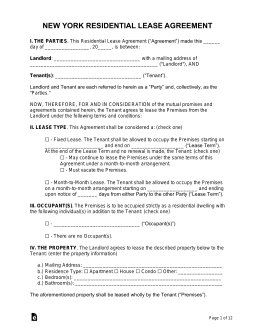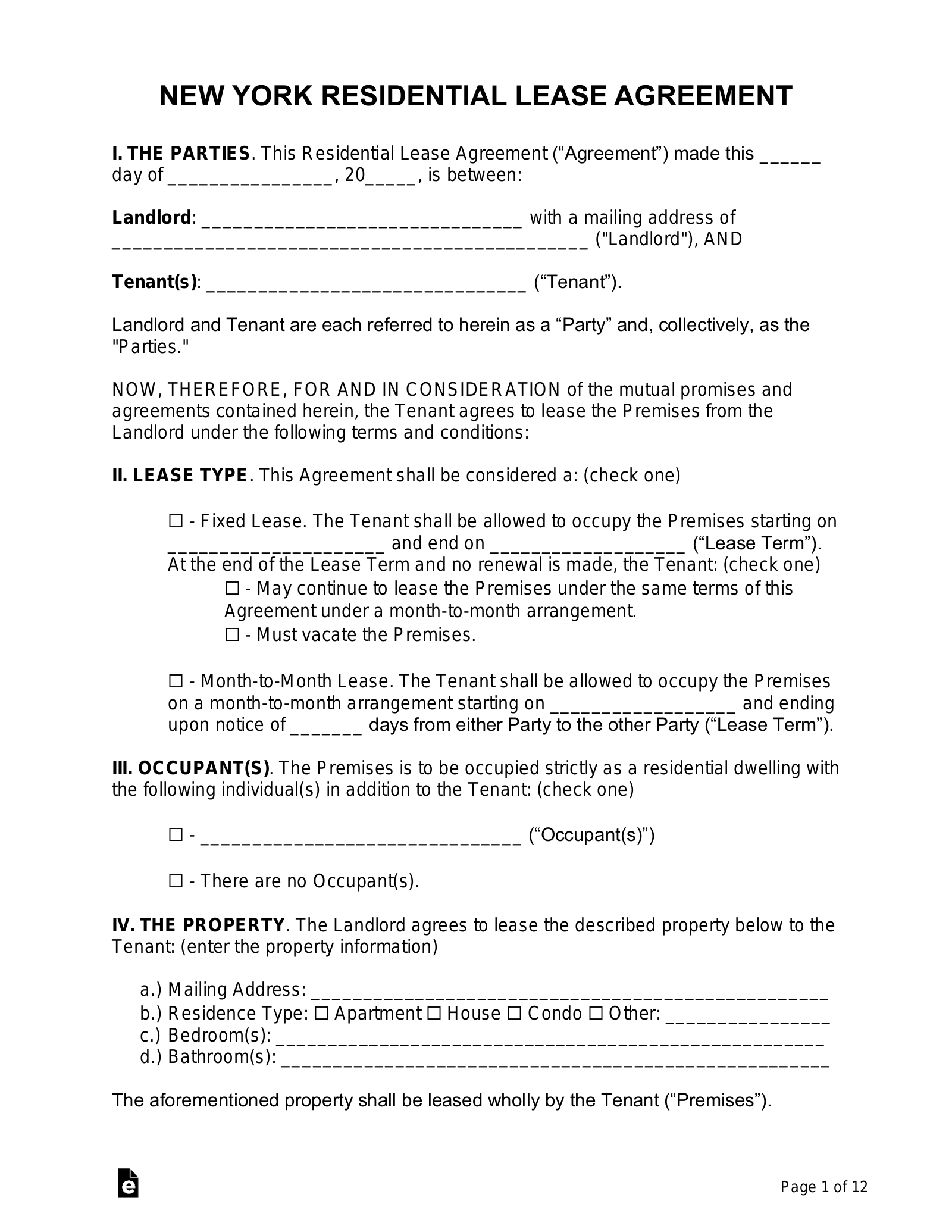Updated February 26, 2024
A New York lease agreement is a binding contract that allows a landlord to rent residential or commercial space to a tenant. It outlines the terms and conditions for the rental period, such as responsibilities, monthly rent, and the end date. Once approved, a lease will be signed between the parties with the first month’s rent and a security deposit due prior to occupancy.
Table of Contents |
Agreement Types (9)
 Standard Residential Lease Agreement – A fixed arrangement that is commonly for a one-year term. Standard Residential Lease Agreement – A fixed arrangement that is commonly for a one-year term.
Download: PDF, MS Word, OpenDocument |
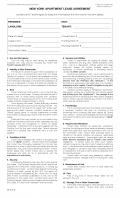 Apartment Lease Agreement – For a residential unit located in a multi-family. Apartment Lease Agreement – For a residential unit located in a multi-family.
Download: PDF, MS Word, OpenDocument |
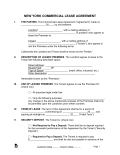 Commercial Lease Agreement – To be used by landlords seeking to rent space related to office, retail, or industrial use. Commercial Lease Agreement – To be used by landlords seeking to rent space related to office, retail, or industrial use.
Download: PDF, MS Word, OpenDocument |
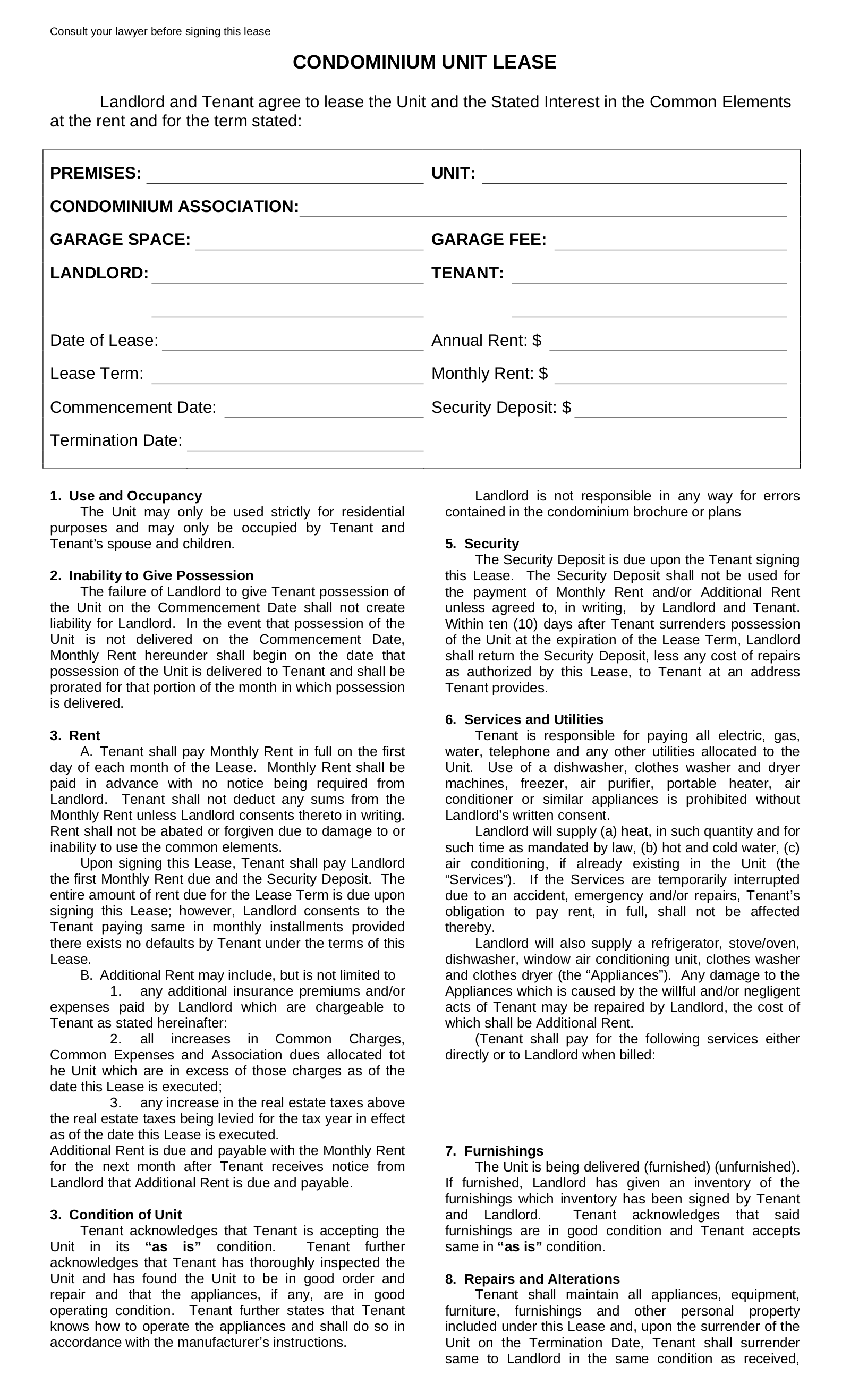 Condominium Lease Agreement – Residence that is usually owned in a property with other individuals sharing common space. Condominium Lease Agreement – Residence that is usually owned in a property with other individuals sharing common space.
Download: PDF |
 Month-to-Month Lease Agreement – Contract that can be canceled at any time with a notice of at least one month by either party. Month-to-Month Lease Agreement – Contract that can be canceled at any time with a notice of at least one month by either party.
Download: PDF, MS Word, OpenDocument |
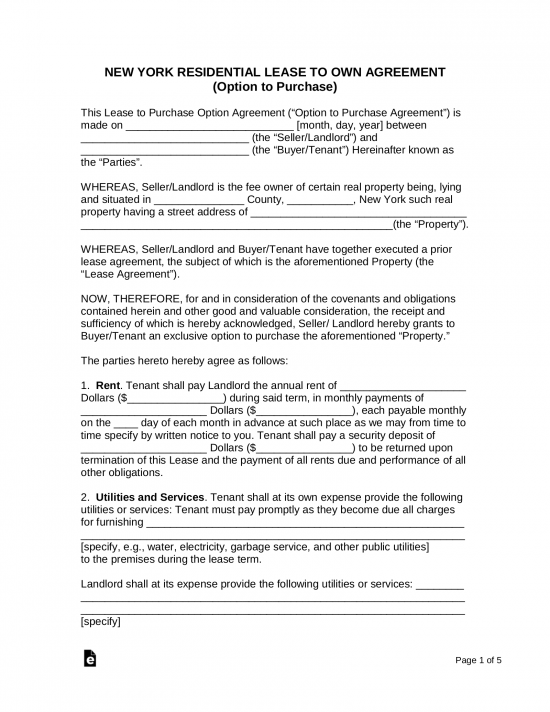 Rent-to-Own Lease Agreement – Tenant/buyer has the right to buy said property on terms agreed upon by the owner/landlord during the course of the occupancy. Rent-to-Own Lease Agreement – Tenant/buyer has the right to buy said property on terms agreed upon by the owner/landlord during the course of the occupancy.
Download: PDF, MS Word, OpenDocument |
 Room Rental (Roommate) Agreement – For the parties living in a shared home to explain the rules and fees of each living companion. Room Rental (Roommate) Agreement – For the parties living in a shared home to explain the rules and fees of each living companion.
Download: PDF, MS Word, OpenDocument |
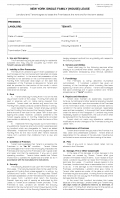 Single-Family Home (House) Lease Agreement – For a residential house that usually has a yard and driveway. Single-Family Home (House) Lease Agreement – For a residential house that usually has a yard and driveway.
Download: PDF, MS Word, OpenDocument |
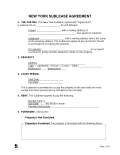 Sublease Agreement – Allows the original tenant to allow a subtenant to take over their lease for a partial or full lease term. Sublease Agreement – Allows the original tenant to allow a subtenant to take over their lease for a partial or full lease term.
Download: PDF, MS Word, OpenDocument |
Required Disclosures (8)
- Allergen Hazards Disclosure (NYC only) – The landlord must complete this disclosure, along with a supplemental disclosure, and perform an annual inspection of indoor allergen hazards such as mold, mice, rats, and cockroaches.[1]
- Bedbug Disclosure (NYC only) – Landlords are required to disclose the rental unit’s history of bedbug infestation for the previous year.[2]
- Copy of Signed Lease (conditional) – For rent-stabilized tenants, the landlord must provide a signed copy of their lease within 30 days of tenancy.[3]
- Flood History Disclosure & Risk Notice – The landlord must advise tenants of the previous flood history and current flood risk of the premises, and every residential lease must contain a specific notice regarding flood insurance.[4]
- Lead-Based Paint Disclosure – Per federal law, the landlord of a building constructed before 1978 must issue this notice to inform the tenant of hazardous paint within the walls and ceiling.
- Security Deposit Receipt – If a security deposit is accepted by the landlord, the name and location of the financial institution where the money was deposited must be relayed to the tenant in writing.[5]
- Sprinkler Disclosure – The lease must disclose whether or not a sprinkler system exists on the premises.[6]
- Stove Knob Covers (NYC only) (conditional) – The landlord must give notice to tenants with children under the age of six of the landlord’s obligation to provide stove safety knobs or knob covers upon request.[7]
Security Deposits
Maximum Amount – One month’s rent is the maximum allowable amount a landlord can charge for a security deposit.[8]
Collecting Interest – The security deposit must be held in an interest-bearing account in a banking organization.[9] The tenant has the option to collect the interest on the deposit annually or apply the balance to their rent.[10]
Receipt – The landlord must provide the tenant with a receipt for their security deposit containing the name and location of the banking organization where their deposit is being held.[5]
Returning – After the tenant has vacated the property, the landlord must return the security deposit within 14 days.[11]
- Itemized List – The landlord must provide the tenant with an itemized statement explaining any withheld amounts from the security deposit within 14 days of the end of tenancy.[11]
When is Rent Due?
Grace Period – A landlord cannot charge a late payment fee until five days after the due date.[12] If rent is not paid on the sixth day, the landlord can issue a 14-day notice to quit, allowing the tenant to pay the owed rent or vacate the property.
Maximum Late Fee ($50) – The landlord can charge $50 or 5% of the monthly amount, whichever is less, for the late payment of rent.[12]
NSF Fee – New York state law does not specify a maximum fee that a landlord can charge for a bounced check. However, such a fee must be included in the lease before it can be charged.[13]
Withholding Rent – If the landlord fails to pay for water service or other essential utilities, the tenant may pay for these services on their own and deduct the cost from any future payments of rent.[14]
Right to Enter (Landlord)
Standard Access – The landlord must provide reasonable prior notice before entering the tenant’s property to provide routine or agreed-upon repairs or services.[15]
Immediate Access – In an emergency, the landlord is not required to seek the tenant’s consent or give prior notice before entering the property.[15]
Abandonment
Absence – New York state law does not establish a specific length of time that a tenant must be absent for a rental property to be considered abandoned.
Breaking the Lease – A tenant may terminate the lease if they are a victim of domestic violence[16] or if they are a senior citizen or a disabled individual who is no longer able to live independently or who has the opportunity to live in an adult care facility.[17]
Tenant’s Utility Shutoff – A landlord may initiate eviction proceedings against a tenant if their failure to maintain essential utilities constitutes “objectionable” conduct.[18] In this case, the landlord must give the tenant 30 days’ notice before being evicted.[19]
Unclaimed Property – New York does not permit landlords to retain the tenant’s personal belongings or furniture following eviction.[20]
Sources
- NYC Admin Code § 27-2017.1
- NYC Admin Code § 27–2018.1
- Tenants’ Rights Guide
- N.Y. Real Prop. Law § 231-B(1)
- N.Y. Gen. Oblig. Law § 7-103
- N.Y. Real Prop. Law § 231-A(1)
- NYC Admin Code § 27-2046.4(a)
- N.Y. Gen. Oblig. Law § 7-108(1-a)(a)
- N.Y. Comp. Codes R. & Regs. tit. 9 § 2505.4(a)
- N.Y. Comp. Codes R. & Regs. tit. 9 § 2505.4(c)
- N.Y. Gen. Oblig. Law § 7-108(1-a)(e)
- N.Y. Real Prop. Law 238-a(2)
- Division of Housing and Community Renewal Fact Sheet #44
- N.Y. Real Prop. Law § 235-a(1)
- Residential Tenants’ Rights Guide (Page 54)
- N.Y. Real Prop. Law § 227-c(1)
- N.Y. Real Prop. Law § 227-a(1)
- N.Y. Real Prop. Acts. Law § 711(1)
- N.Y. Real Prop. Acts. Law § 753(4)
- Residential Tenants’ Rights Guide (Page 36)

